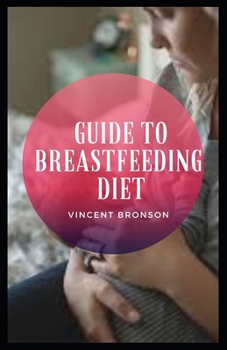Guide to Breastfeeding Diet: Breastmilk is the natural first food for babies, it provides all the energy and nutrients that the infant needs for the first months of life.
Breastmilk is the natural first food for babies, it provides all the energy and nutrients that the infant needs for the first months of life, and it continues to provide up to half or more of a child's nutritional needs during the second half of the first year, and up to one-third during the second year of life.Breastmilk promotes sensory and cognitive development, and protects the infant against infectious and chronic diseases. Exclusive breastfeeding reduces infant mortality due to common childhood illnesses such as diarrhoea or pneumonia, and helps for a quicker recovery during illness.Breastfeeding contributes to the health and well-being of mothers, it helps to space children, reduces the risk of ovarian cancer and breast cancer, increases family and national resources, is a secure way of feeding and is safe for the environment.While breastfeeding is a natural act, it is also a learned behaviour. An extensive body of research has demonstrated that mothers and other caregivers require active support for establishing and sustaining appropriate breastfeeding practices. WHO and UNICEF launched the Baby-Friendly Hospital Initiative (BFHI) in 1992, to strengthen maternity practices to support breastfeeding. The BFHI contributes to improving the establishment of exclusive breastfeeding worldwide and, coupled with support throughout the health system, can help mothers sustain exclusive breastfeeding.WHO and UNICEF developed the 40-hour Breastfeeding Counselling: A Training Course and more recently the five-day Infant and Young Child Feeding Counselling: An Integrated Course to train a cadre of health workers that can provide skilled support to breastfeeding mothers and help them overcome problems. Basic breastfeeding support skills are also part of the Integrated Management of Childhood Illness training course for first-level health workers.The Global Strategy for Infant and Young Child Feeding describes the essential interventions to protect, promote and support breastfeedingBreastfed children perform better on intelligence tests, are less likely to be overweight or obese and less prone to diabetes later in life. Women who breastfeed also have a reduced risk of breast and ovarian cancers. Inappropriate marketing of breast-milk substitutes continues to undermine efforts to improve breastfeeding rates and duration worldwide.
Format:Paperback
Language:English
ISBN13:9798586338921
Release Date:December 2020
Publisher:Independently published
Length:158 Pages
Weight:0.42 lbs.
Dimensions:8.5" x 0.4" x 5.5"
Customer Reviews
0 rating





